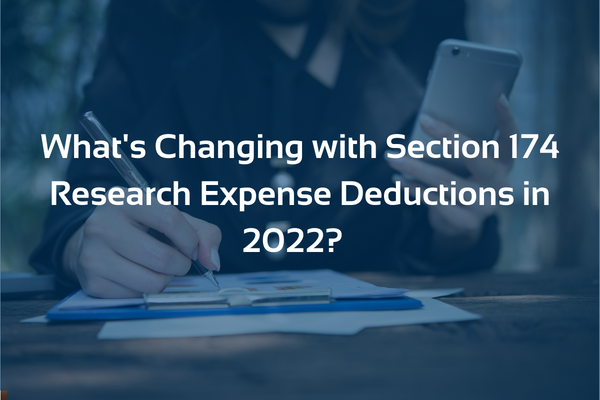What's Changing with Section 174 Research Expense Deductions in 2022?

Section 174 of the Internal Revenue Code has undergone a recent and major change, which may have a lasting impact on how your company's accounting department addresses research and experimental expenditures. Before we dive into the changes, let's take a quick refresher on Section 174.
What is Section 174 of the IRC?
Written all the way back in 1954, Section 174 was designed to "eliminate uncertainty in the tax accounting treatment of research and experimental expenditures and to encourage taxpayers to carry on research and experimentation."
Prior to January 1st, 2022, the code gave businesses two options regarding the treatment of research and experimental expenditures.
- Deduct research and experimental expenditures in the year incurred.
- Capitalize and amortize the expenditures over five years (or 15 years if those expenditures are attributed to foreign research).
This meant businesses could either deduct expenditures immediately or make regular payments on the expenditures. This, along with the Research and Experimentation Tax Credit, encouraged businesses to develop and create innovative initiatives they may not otherwise have.
What is Changing in Section 174?
The Tax Cuts and Jobs Act of 2017 brought many significant changes to the tax code. One of which was an amendment to Section 174, which eliminated the first option we presented above, meaning taxpayers would no longer be able to deduct research and experimental expenditures in the year they were incurred.
Now, businesses must capitalize and amortize the expenditures over five years for domestic research and over 15 years for research conducted outside of the United States.
This change obviously reduces the flexibility of businesses and as the effective date of the amendment draws closer, there has been growing momentum for a reversal.
In 2021, the House of Representatives passed the Build Back Better Act, which along with other major climate and tax-related legislation, included legislation that would delay the Section 174 amendment from going into effect.
As of early August 2022, the bill had not passed the Senate and was effectively replaced with the introduction of the Inflation Reduction Act. On August 16th, 2022 President Joe Biden signed the Inflation Reduction Act into law which did not include a provision to reverse the amendment to Section 174.
As it stands now, the mandatory amortization of R&E expenditures will be the new standard.
What Counts as a Research and Experimental Expenditure?
For many businesses, the first step in preparing for these changes is identifying what qualifies as an R&E expenditure under Section 174.
According to the Internal Revenue Code, "the term research or experimental expenditures, as used in Section 174, means expenditures incurred in connection with the taxpayer's trade or business which represent research and development costs in the experimental or laboratory sense."
The full definition of what the Code considers an R&E expenditure can be read here. Of course, due to the broad nature of items named in the Internal Revenue Code, some legal experts have called for clarification from the Treasury or IRS.
Also noteworthy, is the Research and Experimentation Credit we mentioned earlier, which is often confused, and understandably so, as part of the Research and Experimentation expenditure deduction. The details of the credit are outlined under IRC Section 41.
The change to Section 174 has caused a bit of a stir in the accounting world. As companies navigate the challenges of adapting to the updated Section 174 this year, MRPR is standing by. Our full-service, accounting, and business advisory services can provide clarity on what constitutes research and experimental expenditures for your company, and how best to handle them going forward. Give us a call!
Topics: News


